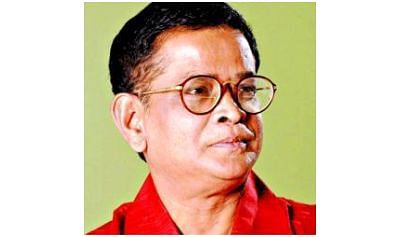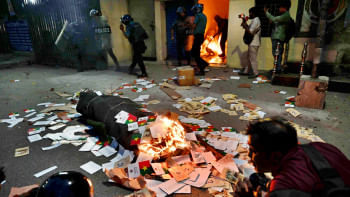Our beloved Humayun Ahmed

I do it with pleasure," responded Humayun Ahmed when a journalist asked him how he managed to write day after day for nearly four decades. "You do not feel exhausted when you do your work with pleasure," he continued. "And I enjoy what I do." For sure, he did. What's more significant, Humayun Ahmed knew how to spread that pleasure among his readers. No other author in Bangladesh ever has enjoyed popularity, fame and admiration to such as an unprecedented extent as Humayun Ahmed did. A man of multi-faceted talent, Humayun Ahmed, has worked in more than one genre -- writing fiction, making dramas and films. In some ways, he redefined Bangla stories, novels, and TV dramas. A novel or TV drama by Humayun Ahmed was unique.
Humayun Ahmed's greatest achievements, however, lie elsewhere.
We largely owe it to Humayun Ahmed that the business of publishing and selling books in Bangladesh has now evolved into a solid industry. Humayun's success as an author has inspired many aspiring, young writers; they learned that it was no longer a daydream tfor a writer in Bangladesh to become a professional author and earn a decent livelihood.
Although his readership was diverse, school and college going youths constituted a large part of it. Until Humayun Ahmed's appearance as a fiction writer, to many Bangladeshi youths reading literature was boring. Humayun Ahmed's unique style of storytelling especially lured young readers. The characters in his fiction, such as Himu, Misir Ali, mesmerised the youth. They would line up at book stalls during Ekushe book fair to buy the latest releases. Reading Humayun Ahmed became fun and a favourite pastime for many. Buying and giving others Humayun Ahmed's books as birthday, wedding gifts became a norm. Humayun Ahmed also gave birth to a new genre in Bangla literature -- science-fiction. Although it was popularised largely by Muhammed Zafar Iqbal, to his credit, Humayun Ahmed wrote the first Bangla science-fiction.
In TV, Humayun Ahmed attracted crowds of viewers at a time when watching the state-controlled TV was torture for the soul. For many viewers, watching Humayun's special dramas on TV became the biggest occasions during the two Eids. Only because of Humayun Ahmed's drama viewers took to the streets to demand revocation of the death sentence of a fictional character.
With the release of Aguner Poroshmoni, Humayun Ahmed made his debut as a film-maker. That was a time when the middle-class had long turned their backs on Bangla cinemas. Unconventional lyrics, lively characters, humorous dialogues and unique story lines -- these were the landmarks of Humayun Ahmed's movies. His movies –
Shraban Megher Din, Dui Duyari, Shamal Chaya, Chandrakarighar -- are evidence that the prospect of Bangla movies is not as bleak as we may think.
Not surprisingly, Humayun Ahmed had many critics as well. Even those who initially were impressed by Humayun's capacity and potential as a writer, at one point, thought that he had turned into a mediocre and commercial author. This included many genuine Humayun well wishers, such as eminent author late Ahmed Sofa. Popular author, educationist Muhammed Zafar Iqbal, who is incidentally Humayun Ahmed's younger brother, once described him as "a skilled photographer equipped with a camera with a very powerful lens who captures mainly photographs of ordinary birthday parties." Such allegations are not without any merit, and on occasions Humayun Ahmed himself acknowledged it.
Nevertheless, Humayun Ahmed loved what he did, and he was a beloved artist. The manifestation of people's love of Humayun Ahmed, more than ever before, has been evident after his death. Bangladeshis from all walks of life -- children, youths, adults, intellectuals, artists, even politicians -- are grieving his rather premature death both at home and abroad. In New York, where Humayun Ahmed passed away, the crowd at his funeral prayer is thought to be the second largest gathering of community people, next only to gatherings during Eid prayers.
"I love reading Humayun Ahmed," a young kid, probably 7 or 8 years, carrying a flower in his hand, said to a journalist. He was one of the several thousand people who had gathered at Dhaka Shaheed Minar to pay respect and catch a last glimpse of Humayun Ahmed. Such was the influence of Humayun Ahmed. An erudite person such as late Prof. Abdur Razzaque had enjoyed reading Humayun Ahmed as much as a young kid does. What else could be more rewarding and honourable to a writer?

 For all latest news, follow The Daily Star's Google News channel.
For all latest news, follow The Daily Star's Google News channel. 



Comments